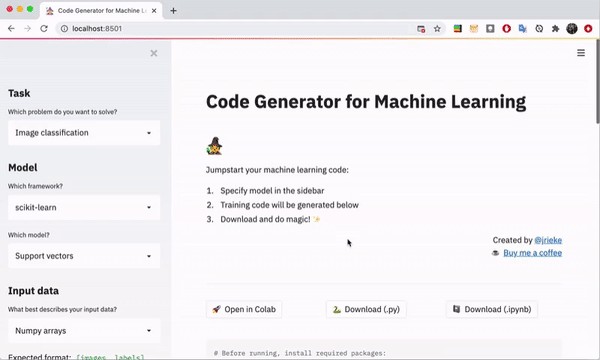
Tackling climate change with ML, deep-learning architecture for creating high-quality animation and a web app to generate code for machine learning in today’s Data Science Daily 📰
Built by Johannes Rieke, traingenerator lets you generate custom template code for PyTorch & sklearn, using a simple web UI built with streamlit. It also offers multiple options for preprocessing, model setup, training, and visualization (using Tensorboard or comet.ml). It exports to .py, Jupyter Notebook, or Google Colab.
Instructions
- Visit https://traingenerator.jrieke.com
- Specify model in the sidebar (click on > if closed)
- Training code will be generated below
- Download and run
Github: https://github.com/jrieke/traingenerator
Last Friday, NeurIPS 2020 partnered with Climate Change AI (CCAI) — an organization of researchers, engineers, entrepreneurs, investors, policymakers, companies and NGOs aiming to catalyze impactful work at the intersection of climate change and machine learning — to host the Tackling Climate Change with ML Workshop, which explored how the ML community could collaborate with other fields and practitioners in this fight.
Machine Learning (ML) is without a doubt an invaluable tool in the fight against climate change. A wide array of applications and techniques are already being explored, from smart electric grid design to satellite-tracking of greenhouse gas emissions and countless others.
Read the official article here
MoGlow is a new deep-learning architecture for creating high-quality animation. Its key advantages include:
- It is general. Unlike most prior work in motion generation, the same method works for generating a wide variety of motion types, such as diverse human locomotion, dog locomotion, and arm and body gestures driven by speech.
- It is controllable: Output motion can be conditioned on an arbitrary control input, such as which direction to walk, used to achieve interactive control over the output motion without algorithmic latency.
- It is probabilistic and learns an entire distribution of plausible output motions that are consistent with the desired control.
Evaluations show that MoGlow produces convincingly natural motion and approaches state-of-the-art performance on each application it was tested on— despite the fact that MoGlow is completely general and free from task-specific assumptions, whereas each state-of-the-art method is custom-designed for a single task only.
Video Demo: https://youtu.be/pe-YTvavbtA
Project: https://simonalexanderson.github.io/MoGlow
Paper: https://arxiv.org/abs/1905.06598
Reach out to us on community@jovian.ai to get featured here. Learn data science and machine learning with free hands-on data science courses on Jovian.
Follow us on Twitter, LinkedIn, and YouTube to stay updated.
